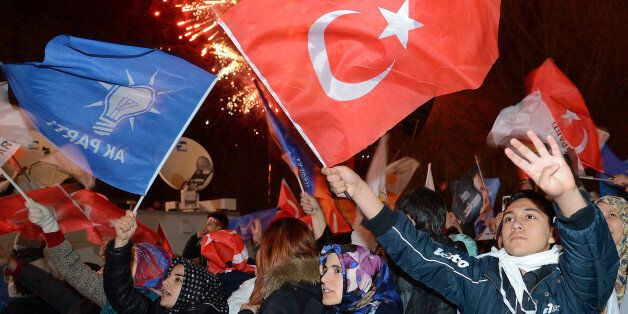ISTANBUL — On Sunday night, well before the results of local elections here came in, Turkey’s Prime Minister Recep Tayyip Erdogan stood in front of thousands of cheering supporters in the capital, thanked God for his party’s win, and told the crowd that it delivered an “Ottoman slap” to the opposition.
Turks saw their votes for local officials as a referendum on the controversial leader, even though Erdogan’s name was nowhere on the ballot. And despite recent anti-government protests and a brewing corruption scandal, Erdogan’s prediction was right: His Islamist-leaning Justice and Development Party, or AKP, captured the most votes.
The win comes as a huge blow to Turks who complain that Erdogan has become increasingly authoritarian during his 11-year rule, cracking down on media, banning YouTube and Twitter, and lashing out at anyone who disagrees with him. Analysts suggest that Sunday’s electoral win is likely to boost Erdogan’s confidence in his political fortunes as he eyes a possible run in this summer’s presidential election.
“Even though these were local elections, they were seen as a vote of confidence for the ruling AKP government, given the domestic challenges and troubles they have been facing,” Didem Collinsworth, a Turkey expert at the International Crisis Group, told The WorldPost. “The prime minister’s retreat to his core constituencies, and abandoning the more liberal supporters, seems to have worked well for him.”
In his speech on Sunday, Erdogan threatened his critics, particularly followers of his onetime ally Fetullah Gulen, a U.S.-based Muslim cleric who is now the prime minister’s nemesis. Erdogan says that Gulen’s movement, made of moderate Islamists, is behind a series of videos and recordings implicating him in a money laundering scandal, and he threatened to take down those who he says are working against him.
“Some people started fleeing; maybe others will flee tomorrow,” Erdogan said in his speech. “They are going to pay the price.”
AKP, which has won three consecutive national elections since 2002, took about 45 percent of the total votes, based on preliminary results. Both AKP and the opposition, the Republican People’s Party, or CHP, accused each other of election fraud. At least eight people died in clashes between supporters of rival political groups.
Meanwhile, many people in Turkey and the United States reported that the newspapers Today’s Zaman and Taraf, known for being liberal and often anti-government, were hacked and that their websites were temporarily down.
Hatija, a 75-year-old woman wearing a headscarf and clutching her cane as she sat down outside a polling station in Istanbul, denied there was any serious polarization in Turkey. Initially reluctant to talk to press, she declined to give her last name.
“People are going crazy,” she said, referring to a flare-up of anti-government protests that began last summer. “I voted for AKP,” she said matter-of-factly, adding that some Turks are just causing trouble for no reason and picking a fight.
Sitting next to her, another elderly woman who also voted for AKP shouted anti-American sentiments, saying that the West should “mind its own business.” Last week, the U.S. government referred to Erdogan’s Twitter ban as “21st century book burning.”
Erdogan’s supporters, largely conservative and religious, often say they now enjoy religious freedoms they didn’t have before the prime minister’s rise to power. Likewise, many poor and working-class Turks say they feel that Erdogan is looking out for them.
But where Erdogan has solidified support, he has left other Turks disillusioned and angry. Several feet away from Hatija, 23-year-old Ezgi, who declined to give her last name because she was speaking publicly against the government, sat with her friends eating lunch after she voted for CHP. With her black nail polish, liberal views and fierce resistance to Erdogan, she represents a secular opposition strikingly different from Hatija.
Last summer, Ezgi protested alongside thousands of other Turks against the government’s plan to create a development in Gezi Park, one of the few green spaces in the city. The protest quickly became a pro-democracy sit-in, with demonstrators criticizing Erdogan for pushing an Islamist agenda and decrying his crackdown on freedom of press and expression.
Critics of the protesters say they are elite and out of touch with the rest of Turkey.
“This is more than an election for Turkey,” Ezgi said defiantly. “This is a fight for freedom.”
Even though local elections are typically fairly uneventful in Turkey, she said this election was different and that Erdogan has to be challenged. Many of her friends voted for the first time on Sunday, she said, and long lines — longer than many Turks say they’ve ever seen — were reported around the country. Even if AKP won, she said before voting closed on Sunday, Turks like her are coming to realize the importance of their vote.
“This country is going in the wrong direction,” she said, hopeful that her vote would help tip the scales against Erdogan. “People are waking up from a deep sleep that was covering Turkey.”
But on Monday morning, many Turks hopeful for change woke up to a country with a ruling party that remained seemingly unscathed, and a controversial ruler whose battle cry against his critics had only been amplified.
“The people gave a clear message to Turkey and to the world,” Erdogan said Sunday night. “What did they say? They said: ‘We are here.’ They said: ‘The Turkish people are impassable. We are the owners of this country. The people will not bow and Turkey is invincible.’”





